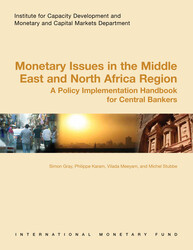
Monetary Issues in the Middle East and North Africa Region: A Policy Implementation Handbook for Central Bankers
Monetary Issues in the Middle East and North Africa Region: A Policy Implementation Handbook for Central Bankers
READ MORE...
Volume/Issue:
Volume 2013
Issue 010
Publication date: May 2013
ISBN: 9781475590562
$20.00
Add to Cart by clicking price of the language and format you'd like to purchase
Available Languages and Formats
| English |
Prices in red indicate formats that are not yet available but are forthcoming.
Topics covered in this book
This title contains information about the following subjects.
Click on a subject if you would like to see other titles with the same subjects.
Banks and Banking , Finance , Money and Monetary Policy , DPPP , DP , rate of exchange , FX market , quantitative easing , bank deposit , inflation targeting , money market , U , S , dollar , financial market , foreign exchange , nominal exchange rate , Exchange rate arrangements , Exchange rates , Monetary policy frameworks , Central bank policy rate , Liquidity , Global , Middle East and Central Asia , Middle East
Summary
This paper documents the main themes covered in two seminars (December 2011 and September 2012) on monetary policy and implementation at the IMF—Middle East Center for Economics and Finance, and includes country case studies. Against the backdrop of the global financial crisis and swings in cross-border capital flows, operational frameworks have become more flexible, and liquidity management has impacted the relationship between the policy rate corridor and market rates. The balance sheet structure of central banks in the Middle East and North Africa (MENA) shows differences between oil exporters and others, while a few countries have exhibited notable changes since early 2011. Collateral now has a significant financial stability function. Although only one MENA country is part of the G20, implementation of the Basel III bank capital adequacy and liquidity rules will most likely impact banks’ way of doing business in MENA countries, even if indirectly.



